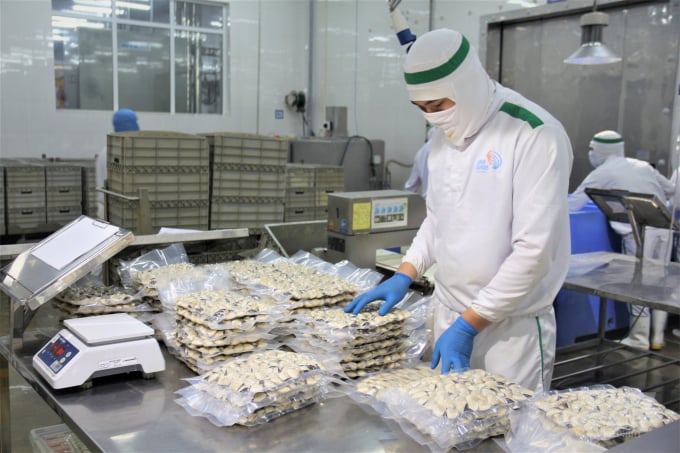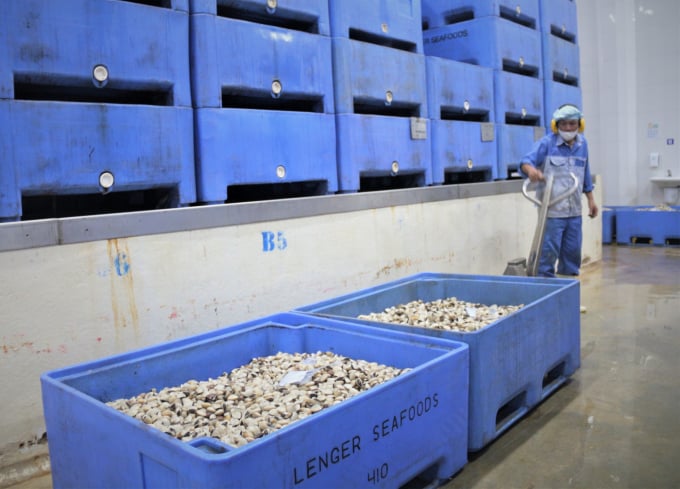June 21, 2025 | 03:37 GMT +7
June 21, 2025 | 03:37 GMT +7
Hotline: 0913.378.918
June 21, 2025 | 03:37 GMT +7
Hotline: 0913.378.918

Mollusks is among five aquaculture products for export of Vietnam with the yearly export value of about US$659 million. Photo: Pham Hieu.
According to the Department for Agricultural Products Processing and Market Development under the ministry, mollusks including clams, scallops, oysters and mussels are among five key agriculture products for export of Vietnam with export revenue of about US$ 659 million.
At present, coastal provinces in Hong ( Red) River Delta are major mollusks producing and processing areas in Vietnam with a total mollusks farming area reaching about 41,000 ha.
For recent years, the agriculture ministry has paid attention to develop close value chains for mollusks so that the Vietnamese products could better meet requirements and standards of importers around the world including China, EU and US.
Despite the negative impacts of COVID-19 pandemic, the European market, particularly Spain and the Netherlands last year imported many mollusks products from Vietnam as the Europe-Vietnam Free Trade Agreement (EVFTA) took effects in 2020.
Quốc Toản, director-general of the General Department for Agricultural Products Processing and Market Development told Vietnam Agriculture newspaper that demand for mollusks in potential markets was likely to increase in coming time.
“It’s time for us to improve legal framework so that mollusks production could be organised systematically and more reasonably,” he said.
A master plan for mollusks industry was needed, Toan said, emphasizing the need to develop close value chains, traceability and even Geographical Indication (GI) for mollusks to make Vietnamese products better meet requirements of demanding importers.
It was also necessary for Vietnam’s mollusks industry to develop strong brandings with closed modern processing complex, Toan said.

Close value chains and product traceability are among key factors for Vietnam’s mollusks industry develop sustainably and further integrate into the global stage. Photo: Pham Hieu.
“The linkage between household farms and importers should be tightened, so that not only FDI enterprises, big producers but also farmers could have a better market understanding,” Toan said, adding that better market understanding would help farmers improve their livelihood and turn prosperous with mollusks.
Compared with other countries in the world and Asia, Vietnam was quite good at aquaculture product processing but mollusks group was very typical.
“It’s time to develop processing complex to engage household farmers as satellites,” he said.
“To develop the mollusks industry sustainably, it’s a must to have a stable raw material zone, technological applications, expanded markets and improved capacity for mollusks farmers,” Toan said.
A bottle-neck in agricultural production now in Vietnam was the connection between processing complexes and material zones.
It was necessary to expand cultivation areas or increase productivity thanks to sciences and technologies, planning and market forecasting.
There were three main problems for Vietnam to solve, Toan said.
Firstly, it was about the harmony between raw material zones and market demand. Secondly, it was needed to identify the processing areas. The third problem related to the labour force in localities and labour in agriculture.
Thus, localities played an important role in organising and developing agriculture production.
To mollusks industry, besides the issue of raw material areas, processing was a pending problem as now, mollusks were mostly processed and packed simply. Deeper processed products could generate more values./.
Translated by Bich Huong

(VAN) The waste of resources from agricultural by-products and the situation of counterfeit and poor quality goods in production causing losses of thousands of billions were pointed out by the National Assembly deputy.

(VAN) After 5 years of implementation, the CAI initiative has helped coffee growers change their farming practices, moving toward responsible agriculture that meets global export standards.

(VAN) The primary prerequisite for the comprehensive and robust integration of Vietnam's livestock sector into the global value chain is the establishment of a disease control system.

(VAN) The results of national programs are essential for establishing a contemporary livestock sector that is well-equipped to meet the demands of both domestic and international markets, with robust biosafety standards.

(VAN) The UNESCO Global Geopark revalidation of Non nuoc Cao Bang and the transition to a two-tier administrative model are presently undergoing a pivotal moment in Cao Bang, the northernmost province of Vietnam.
/2025/06/13/5330-2-004539_953.jpg)
(VAN) Changing policy mindset and removing investment barriers are urgent requirements to open up new development space for enterprises in the agricultural sector.

(VAN) The areas include the restoration of five million hectares of marine ecosystems.